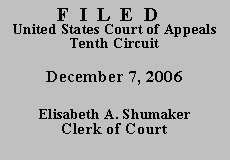

| JAMES CALVIN DYER, | |
| Plaintiff-Appellee, | |
| v. | |
| JIM RABON; ARTHUR LIGHTLE; CARLA M. RICKMAN, Individuals, | |
| Defendants-Appellants. |
Appellee filed this § 1983 action against various Oklahoma corrections officials alleging violations of his Eighth and Fourteenth Amendment rights due to improper administration of his prison sentence. According to Appellee, he initially was charged with attempted robbery with a dangerous weapon in violation of 21 Okla. Stat. § 801. Ultimately, however, he was recharged with and pled guilty to robbery with force in violation of 21 Okla. Stat. § 791. Appellee asserted that the corrections officials failed to attribute to him sentence-reducing credits because they were calculating his credits based on robbery with a dangerous weapon rather than robbery with force. Pursuant to 21 Okla. Stat. § 13.1, persons convicted of, inter alia, robbery with a dangerous weapon are required to serve not less than 85 percent of any prison term before becoming eligible for parole consideration. Appellee's various complaints to the corrections officials failed to resolve the miscalculation. He subsequently sought relief from the state court, which issued an Amended Judgment and Sentence to reflect that his conviction fell under 21 Okla. Stat. § 791, prompting recalculation of his credits, modification of his sentence, and his immediate release from prison.
This action was filed in May 2005, seeking damages for Appellants' allegedly unconstitutional acts. In June 2005, Appellants filed their respective motions for summary judgment asserting qualified immunity. In January 2006, the district court held a scheduling conference at which a scheduling order was imposed that set discovery and dispositive motion deadlines, among others. Appellants then moved to stay discovery until a ruling on the motions for summary judgment was issued. On March 30, 2006, the district court issued a minute order striking the pending summary judgment motions, to be reurged consistent with the scheduling order, and finding the motion to stay moot.
Appellants argue on appeal that the district court erred in refusing to address their respective qualified immunity motions and that this refusal is immediately appealable. Appellee argues that because the district court has not yet ruled on the issue of qualified immunity, the issue is not ripe for appeal.
Our decisions in Workman v. Jordan, 958 F.2d 332 (10th Cir. 1992), and Lowe v. Town of Fairland, Okla., 143 F.3d 1378 (10th Cir. 1998), make clear that a district court's postponement of or failure to rule on a qualified immunity defense is immediately appealable. This result is driven by the purpose behind qualified immunity, which protects an official not only from liability, but also "from the ordinary burdens of litigation, including far-ranging discovery." Workman, 958 F.2d at 335 (noting the appropriate discovery limitations that district courts impose when qualified immunity motions are outstanding). Accordingly, we may properly turn to the merits.
These same two cases, however, also make clear that this court should not determine whether qualified immunity exists where the district court has not yet passed upon the issue. As pointed out in Workman, although Appellants ask us to determine this issue, and this court has honored such a request in at least one other case, see Laidley v. McClain, 914 F.2d 1386, 1394 (10th Cir. 1990), we believe the better practice is to remand such a determination to the district court, see Workman, 958 F.2d at 336-37.
Accordingly, the minute order striking the pending motions for summary judgment is REVERSED, and the matter is REMANDED to the district court for immediate consideration of the Appellants' respective qualified immunity challenges.
Entered for the Court
Monroe G. McKay
Circuit Judge
*. This order and judgment is not binding precedent, except under the doctrines of law of the case, res judicata, and collateral estoppel. It may be cited, however, for its persuasive value consistent with Fed. R. App. P. 32.1 (eff. Dec. 1, 2006) and 10th Cir. R. 32.1 (eff. Jan. 1, 2007).